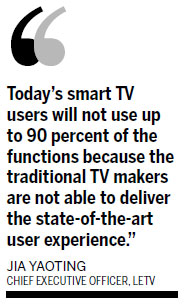
First we had 'the box', then the flat screen. Next it'll be interactive
Chinese online video website LeTV.com's idea of producing smart television sets may provide an edge for the Internet company because they are set to overtake traditional TVs in the coming years. However, LeTV should tackle a couple of difficulties before it can hope to lead the industry, analysts said.
|
 |
|
LeTV.com, operated by Beijing LeTV Mobile Media & Technology Co, is seeking cooperation with electrical appliance producers so it can enter the smart TV market. [Photo/China Daily] |

On Sept 19, the Beijing-based online video provider announced its plans to release an independent-branded smart TV product, making itself the world's first Internet company to tap into the TV hardware manufacturing sector.
"The TV industry has not made any change in the past 30 years in terms of profit model and marketing methods. Traditional TV makers only play a role as hardware producers," said Jia Yaoting, chief executive officer of LeTV.
With an increasing number of people abandoning TV and looking for a more interactive way to watch video, "It's time to launch a revolutionary product in the TV industry," said Jia.
Kai-Fu Lee, a renowned investor and former president of Google China, warned that the emerging sector is facing some problems in the short run, although he was optimistic about the development of smart TV.
"Providers should get reliable content resources from program makers and TV stations, which is a difficult task to do in China. In addition, the current broadband network is not good enough to handle the huge amount of video data," said Lee, adding that LeTV's move may speed the introduction of the next generation of TVs by two to three years.
Lee has invested in LeTV's smart TV project but by how much wasn't revealed.
Earlier this year, LeTV launched a set-top box with CNTV, a major online news video provider under China Central Television, the nation's biggest broadcaster.
The Shenzhen-listed company planned to inject at least 100 million yuan ($15.8 million) over the next 12 months into a subsidiary in charge of smart TV and set-top box projects.
Analysts said the smart TV devices will enable LeTV to move its paid content from laptops to TVs. LeTV pledged to obtain 60 to 70 percent of the nation's exclusive TV series resources, making itself the largest Internet-based TV series broadcasting platform.
"Customers' demand regarding TV has changed dramatically over the past decades. The audience will find ways to interact with video content, something that traditional TVs cannot accommodate," said Xue Yongfeng, an analyst with Analysys International.
Web-based video content, which enabled real-time sharing and commenting, is more likely to be accepted by younger people and frequent Internet users.
China's online video segment continued to grow in 2012. The sector saw a 50 percent quarter-on-quarter growth in the second quarter of this year, according to IT research firm iResearch Consulting Group. Viewers of online video content hit about 400 million, it added.
"Today's smart TV users will not use up to 90 percent of the functions because the traditional TV makers are not able to deliver the state-of-the-art user experience," said Jia.
Meanwhile, data from iResearch Consulting Group said only 30 percent of the TVs in Beijing were used daily in 2011, while the rate was 70 percent three years ago.
However, traditional TV manufacturers did not see LeTV as a big threat.
"The Internet companies' plan of entering the TV industry may help to boost the languid TV industry," Beijing News reported, citing Yang Dongwen, vice-president of Skyworth Group, one of the leading TV makers in the nation.
TV makers' worry-free attitude was partially because LeTV has yet to release details of its plans, let alone any physical product.
The company also did not specify when its device will enter the market. The products will not be released by the end of this year, Jia told China Daily.
In 2011 a total of 50 million TVs were sold in China, with a turnover of 200 billion yuan, said Jia.
gaoyuan@chinadaily.com.cn
 Overdue loans pile pressure on lenders
Overdue loans pile pressure on lenders Japanese automakers face tough times in China
Japanese automakers face tough times in China Volvo plans expansion amid slowdown
Volvo plans expansion amid slowdown